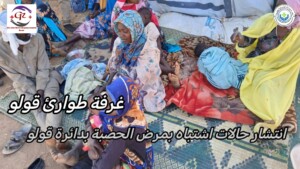Sit-in against toxic mining in Sudan’s South Kordofan
The open sit-in of residents of Kalogi in South Kordofan has entered its second consecutive day in protest against the work of mining companies using cyanide and other toxins.
 South Kordofan showing Kalogi (smallarmssurveysudan.org)
South Kordofan showing Kalogi (smallarmssurveysudan.org)
The open sit-in of residents of Kalogi in South Kordofan has entered its second consecutive day in protest against the work of mining companies using cyanide.
Ahmed Mukhtar, secretary-general of the National Committee for Environmental Protection, told Radio Dabanga that the town’s residents have been in an open sit-in since Tuesday in protest against a gold mining company that uses substances harmful to the environment, human, and animal health.
He pointed to the protesters’ submission of a memorandum to the local authorities in which they demanded that all mining companies that create toxic conditions for the safety of humans, animals, and the environment, be moved out immediately, and compensation made for the damage caused.
The residents conditioned lifting the sit-in with all of their demands being met.
Mukhtar called on the government to intervene to protect the residents from the dangers of these toxic substances
Buried toxins
A joint committee set up by the authorities of El Tadamon in South Kordofan revealed the presence of toxic substances buried in the ground in the area of El Jaghrour.
Mukhtar reported that a joint committee of the authorities of El Tadamon and an environmental protection committee toured the mining sites in the area on Tuesday and found buried materials belonging to one of the mining companies of Jaghrour mine in the El Wakara administrative unit.
The health condition of the five people in Talodi of South Kordofan who suffered severe damage to their bodies as a result of unknown substance used in mining on Sunday deteriorated. They were transferred to the Omdurman Teaching Hospital.
One of the affected people told Radio Dabanga on Wednesday from the Omdurman Teaching Hospital that their health and psychological condition is critical and that they feel faint, loss of appetite, difficulty in breathing, joint pain, as well as impotence and severe sensitivity to water.
He explained that they feel burned and their skin disintegrated as soon as they come in contact with water.
He pointed out that the results of the examination of the harmful substance have not been published and the mining company has not sent anyone to follow up their health.
Radio Dabanga’s editorial independence means that we can continue to provide factual updates about political developments to Sudanese and international actors, educate people about how to avoid outbreaks of infectious diseases, and provide a window to the world for those in all corners of Sudan. Support Radio Dabanga for as little as €2.50, the equivalent of a cup of coffee.












 and then
and then